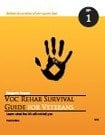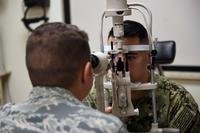Kick it into gear before your first Voc Rehab meeting.
I wrote an Op Ed on this subject over a year ago called “The Lies They Tell.” After a few VA employees threatened to close their accounts, we changed the name to “The Truth About Voc Rehab.”
Of course, it got mixed reviews. Practically every veteran who had a tough time with the program agreed. Meanwhile, Voc Rehab Counselors wrote in about how insulted they were. It happens. I think when a person works for the VA Machine, that they have to expect a degree of insult. And to those VA employees who are good, we’re not talking about you, we’re talking about the system.
Part 1: Voc Rehab Orientation
The DVA has no issue with slamming on other websites and on authors selling books. On VAntage Point, the VA’s newest attempt at putting lipstick on the pig, the federal employees tell you what you need to think about other sources of information. Here's a recent quote from their website:
"One of the most common things I hear from fellow Veterans is 'I don’t know what benefits I qualify for.' VA.gov is admittedly clunky and confusing (something we’re looking to fix), and there are many websites that promote bad or inaccurate information about Veterans benefits. It’s no wonder that many folks have questions about what they’re entitled to after leaving the service."
I underlined the “bad or inaccurate” part so no one misses it. Remember, the DVA has a $3.2 billion IT budget every year. With that, they probably could build a better website or hire someone to fix the "clunky and confusing" part in about a day.
Here, let’s test their words quoted above. Click here to download their new VA benefits manual PDF. Go to the bottom of page 29 to read about Vocational Rehabilitation. The VA spent 2 pages on the subject. Read the pages. Ask yourself, what kind of degree can I get? Can I use the program more than once? What if they tell me Voc Rehab won't help?
Now, the guide I wrote, which just focuses on Voc Rehab, is 60 pages. (Mine is more about the questions Voc Rehab Counselors don't answer.) But it's not the size that matters. After all, I’m not here to see who has the biggest tractor. I’m here to see which tractor works best. I have a hunch many of you will get more bang for your buck (time reading) out of this blog post than from their VA benefits guide on Voc Rehab.
Pull their guide up and put this blog post next to it for cross-comparison. See if it answers any of the fibs in Part 2 that Voc Rehab Counselors tend to tell veterans. Counselors will count on the following when you first meet with them:
- You may or may not have read their website
- All non-DVA websites promote "bad or inaccurate information"
- Their website is "clunky and confusing" (on purpose)
- There is no real accountability if they give you bad information orally, only if given in writing
Always remember, many counselors don’t lie or intentionally mislead, but you want to be sure yours is being a straight shooter by being armed with the facts, yourself.
Part 2: Voc Rehab Fibs and the Truth
Lie #1 “We won’t pay for more school.”
This comes into play when you’re about to finish your educational track or training track and realized you cannot find a job with your degree. A typical example of this would be someone who got a degree in Psychology or Sociology, degrees with no real tangible skill that helps you find a job directly translatable job. A degree in Accounting would be the opposite, where you can usually find a job as an accountant.
Truth: Notice the grammar, “We won’t pay for more school.” When I heard this when I first applied, I took it to mean Voc Rehab “could not” pay for school beyond an undergrad. Won’t ≠ Can’t. It can pay for much more than you may think.
Lie #2 “No more benefits beyond 48 months.”
Many counselors flat out tell this to vets. Meanwhile, the VA Guide does mention that limitations can be extended but doesn’t tell you how to get it done. One has to wonder why that is. I mean, with a pretty healthy budget, and the VAntage Point telling you the VA wants to do more, why can’t the VA do more? Why can't their guide flatly tell veterans when they can and cannot qualify for more than 48 months of benefits? The answer: it’s because they won’t, not because they can’t.
Truth: The 48-month limit can be extended if the veteran is deemed to have a “serious employment handicap.” This can be found in 38 CFR Part 21.52 “Determining a Serious Employment Handicap.” Beyond this, a counselor told me that they could increase beyond 48 months for other reasons based on the need for “additional schooling.”
Lie #3 “Voc Rehab only covers practical degrees.”
The above Benefits Guide touted by the VA above gives no mention of the types of degrees a veteran can obtain. During most initial meetings with Voc Rehab Counselors, veterans are told what types of degrees they can obtain. As a general rule of thumb, the counselor will steer them in a direction the counselor feels the most comfortable with, not always what the veteran wants.
Truth: I know of quite a few veterans who were approved for very obscure degrees. One woman was approved for a Masters Degree in Theology. Another veteran received funding for a degree in Music and another in Art and still another for a Masters of Fine Arts.
Lie #4 “Chapter 31 will not cover graduate school.”
This is a biggie. I was told this. Many veterans are told this. Is it true? No.
Truth: A veteran can obtain a graduate level education through Chapter 31 Voc Rehab, period. There are many Board of Appeals claims you can find online where the veteran won his or her claim requesting payment of a graduate degree. It happens, just not that often.
There, that’s enough to get things moving. Again, not all VA employees are bad; however, when it comes to my hard earned benefits, I always like to get the facts first. Better you go in armed than ignorant. Remember: Wise as a serpent, innocent as a dove. Check out www.disabledveterans.org for more information.
# # # # #
 Benjamin Krause is an award winning investigative journalist, attorney, and disabled veteran of the US Air Force, where he served in its Special Operations Command. He wrote his guide, the Voc Rehab Survival Guide for Veterans, after winning his long fight for benefits against VA to help other veterans do the same. Benjamin is a graduate of Northwestern University and the University of Minnesota Law School using VA Vocational Rehabilitation.
Benjamin Krause is an award winning investigative journalist, attorney, and disabled veteran of the US Air Force, where he served in its Special Operations Command. He wrote his guide, the Voc Rehab Survival Guide for Veterans, after winning his long fight for benefits against VA to help other veterans do the same. Benjamin is a graduate of Northwestern University and the University of Minnesota Law School using VA Vocational Rehabilitation.



